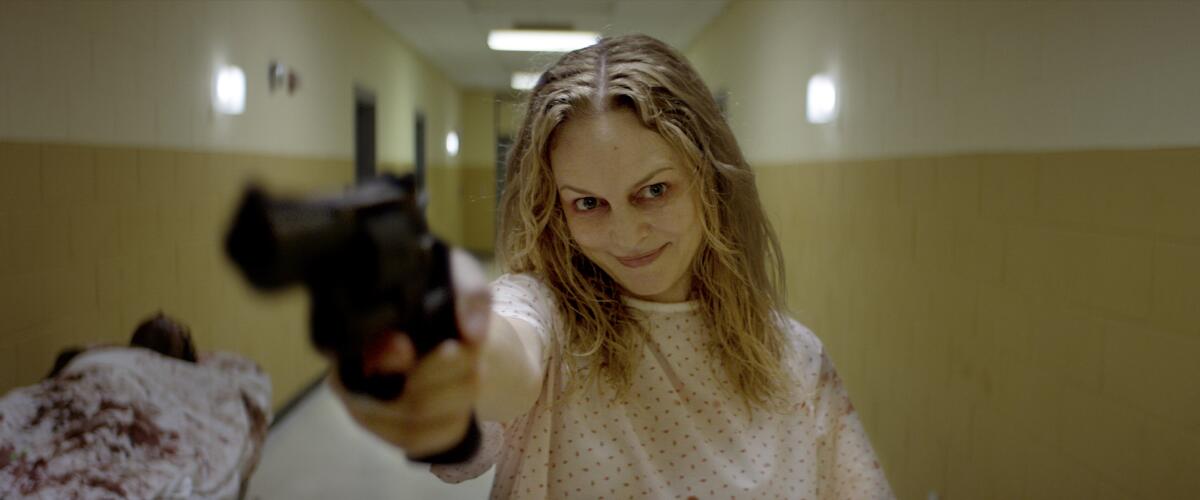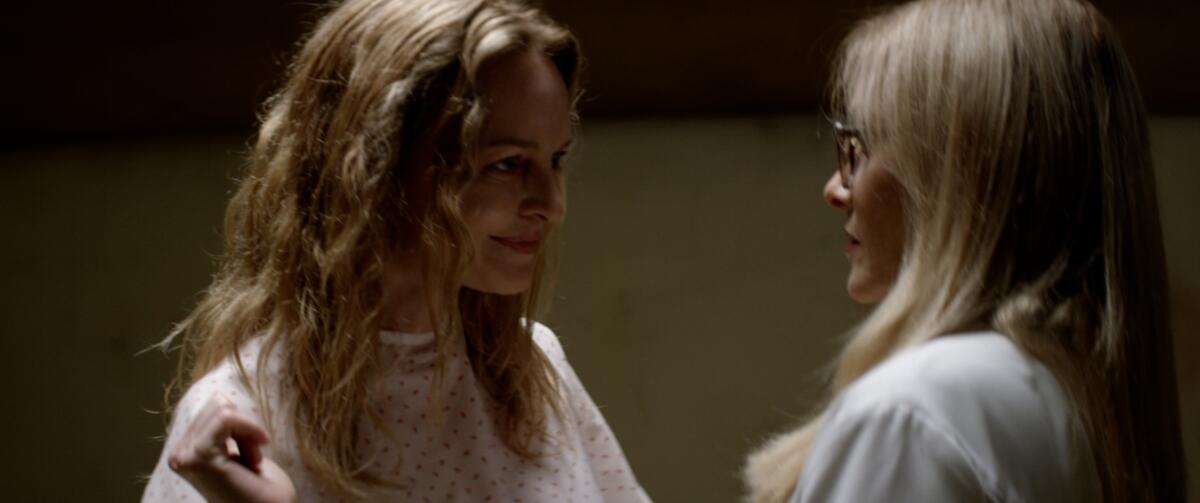Review: The gory trappings of Stuart Gordon’s 1980s horror hits make for ‘Suitable Flesh’

- Share via
Giggles have always had their place in the enjoyment of horror, whether tacked onto the end of a prolonged freakout or as a nervous placeholder that acknowledges a silly premise before we fully get owned by terror and blood.
But Stuart Gordon, who died in 2020, believed real laughs belonged in true horror, like a complementary energy source, as his gore-ific cult hits “Re-Animator” and “From Beyond” proved. It’s fitting that he’s the dedicatee at the end of director Joe Lynch’s body-possession lark “Suitable Flesh,” since it’s a mostly amusing throwback to Gordon’s brand of blackly comic grisliness, starting with the fact that it’s also an H.P. Lovecraft adaptation (of his 1937 short story “The Thing on the Doorstep”), written by frequent Gordon collaborator Dennis Paoli, and starring the late director’s mainstay Barbara Crampton (also a producer) in a prime role.
Just as prominent in Lynch’s shout-out sweepstakes, however, are the naughty-peekaboo trappings of Brian de Palma’s violent melodramas, which initially take pride of place here as Heather Graham’s institutionalized, wild-eyed psychiatrist Elizabeth Derby spins a tale from her padded cell to her doctor friend Daniella (Crampton) about a malevolent force trying to get her. (Another connection: We’re in the same Miskatonic med school where “Re-Animator” was set.)
Days prior, an anxious young patient named Asa (Judah Lewis) had come to Elizabeth with a tale of being the target of body possession, complete with an in-session seizure and instant change to a more arrogant, suggestive, darker personality. Later, during sexy time with her horny, ignored husband (Johnathon Schaech), a vision of Asa briefly takes over Elizabeth’s mind. Since Elizabeth wrote the book on mind/body splits (there’s always a cutaway to a thick tome as proof), her way of helping means getting more involved. She visits the creepy house where Asa lives with his father (Bruce Davison), who appears angrily haunted as well, and soon the corporeally hungry, lascivious force takes over Elizabeth too.

In her possession scenes, Graham has great fun dialing down her golden-girl shine and ramping up a smirking, predatory air, a refreshingly parodic twist on years of sexpot-role survival in a male-dominated industry. Too bad the weak body-swapping farce she’s given to play isn’t worthy of her gameness, a missed opportunity to fuse Lovecraft, Blake Edwards and Paul Verhoeven. Lynch does exhibit a winking fondness for the sax-scored signposts of ‘90s cable eroticism, but it’s not always clear what’s intentionally funny about these style tags.
Meanwhile, the De Palma-fication — split screens, camera swivels, composer Steve Moore’s Pino Donaggio-like score — doesn’t really add anything except make one wish to be more authentically inside the premise’s nightmare ride (which De Palma was so expert at) rather than observing a fan’s riff. Much more enjoyable are the parts where Gordon’s influence is prominent, especially the splattery transference-apalooza at the psych ward, where the story catches up to where it all started and we know what we’re laughing and wincing at. Crampton’s genre-burnished authority is particularly disarming here, juggling the preposterous and the believable as memorably as she did in Gordon’s madness-and-mayhem classics.
Despite its bumpy execution and general thinness, “Suitable Flesh” boasts a playfulness that feels ripe for slicing up and serving anew. Gordon energized an earlier generation’s horror with his indie era’s shock-and-ha tactics, so it makes sense that today’s filmmakers want to tweak what they grew up with, hence Ti West’s slasher-inspired “X” movies, Peter Strickland’s giallo slayings, James Wan’s neo-”Amityville” conjurings and Ari Aster’s art-cinema dread. Unfortunately, Lynch’s bid isn’t in their league; he can lab-copy but he’s no mad scientist.
'Suitable Flesh'
Not rated
Running time: 1 hour, 39 minutes
Playing: Alamo Drafthouse DTLA, Laemmle NoHo
More to Read
Only good movies
Get the Indie Focus newsletter, Mark Olsen's weekly guide to the world of cinema.
You may occasionally receive promotional content from the Los Angeles Times.










